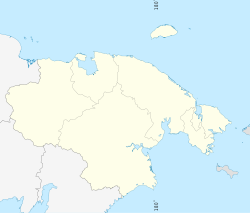Enurmino
| Enurmino (in English) Энурмино (Russian) Иннурмин (Chukchi) |
|
|---|---|
| - Rural locality - Selo |
|
 Location of Chukotka Autonomous Okrug in Russia |
|
|
|
|
|
|
|
| Administrative status (as of June 2009) | |
| Country | Russia |
| Federal subject | Chukotka Autonomous Okrug |
| Administrative district | Chukotsky District |
| Municipal status (as of November 2004) | |
| Municipal district | Chukotsky Municipal District |
| Rural settlement | Enurmino Rural Settlement |
| Administrative center of | Enurmino Rural Settlement |
| Statistics | |
| Population (2010 Census) | 301 inhabitants |
| Population (January 2016 est.) | 291 inhabitants |
| Time zone | PETT (UTC+12:00) |
| Postal code(s) | 689320 |
| Dialing code(s) | +7 42736 |
Enurmino (Russian: Энурмино; Chukchi: Иннурмин; Yupik language: Анушпик and also known as Ennurmin (Russian: Эннурмин) and Enyurmin (Russian: Энюрмин)) is a rural locality (a selo) in Chukotsky District of Chukotka Autonomous Okrug, Russia. It is located on the Chukchi Sea near Cape Serdtse-Kamen. Population: 301 (2010 Census); Municipally, Enurmino is subordinated to Chukotsky Municipal District and incorporated as Enurmino Rural Settlement.
The name of the village comes from the Chukchi I'nnurmin, meaning "a place behind the hills", as the village is located in a valley surrounded by hills. Nearby discoveries have revealed the site of an older village where the ancestors of those who live in Enurmino used to live, with the site of the village itself sitting on top of an ancient Chukchi settlement. Nearby the village is the abandoned settlement of Chegitun (Russian: Чегитун), occupied from about 500 AD to the twentieth century, until the village was closed and the population transferred to Inchoun.
In 1926, the village had a population of 103, which grew to 275 by 1943, consisting of 259 Chukchi, 1 Yupik and 15 visitors. During the Soviet period, the people of Enurmino, in collaboration with the people of Neshkan further down the northern Chukotka coast, formed the Sovkhoz 50th Anniversary of the Great October (Russian: 50-летия Великого Октября). In addition to the Sovkhoz, there was also a polar station in the village called Netten, (Russian: Нэттэн). The staff at this polar station used to play chess games over the radio with scientists at polar stations in the Antarctic.
...
Wikipedia

